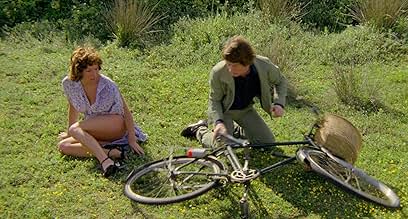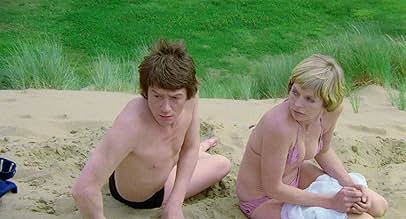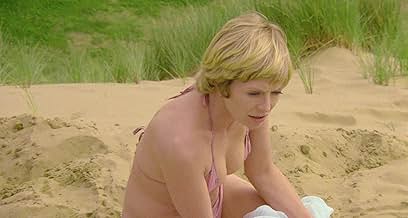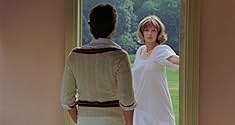AVALIAÇÃO DA IMDb
6,5/10
5,8 mil
SUA AVALIAÇÃO
Adicionar um enredo no seu idiomaA traveller by the name of Crossley forces himself upon a musician and his wife in a lonely part of Devon, and uses the aboriginal magic he has learned to displace his host.A traveller by the name of Crossley forces himself upon a musician and his wife in a lonely part of Devon, and uses the aboriginal magic he has learned to displace his host.A traveller by the name of Crossley forces himself upon a musician and his wife in a lonely part of Devon, and uses the aboriginal magic he has learned to displace his host.
- Direção
- Roteiristas
- Artistas
- Prêmios
- 1 vitória e 1 indicação no total
Graham Kingsley Brown
- Village Churchgoer
- (não creditado)
Joanna Szczerbic
- Cricket Umpire
- (não creditado)
- Direção
- Roteiristas
- Elenco e equipe completos
- Produção, bilheteria e muito mais no IMDbPro
Avaliações em destaque
An inmate (Bates) at a lunatic asylum relates a bizarre tale to a visiting doctor (Curry) during a surreal cricket match between the patients and staff. The story details in flashback, how Bates came between a man (Hurt) who happens to be playing in the match, as a doctor I believe, and his wife (York) who is seen at the beginning and end of the film as a nurse at the asylum.
Man, where's this movie been all my life? Brilliant, absolutely brilliant but mysteriously forgotten British psycho horror flick of the late 70s, that features among everything else, an A-1 cast. It reminds me once again how dumb the Hannibal movies are. Ever get the feeling Anthony Hopkins realizes this too? Watch him sometimes when he thinks the camera isn't on him, he's laughing his butt off. Sorry, if you like disturbing well made horror films, that delve into the subject of madness and perspective vs. reality? You will like this. The old gimmick of Dr. Caligari has been used and abused, but this film plays honest because you know from the outset, that a madman is narrating the story. The film is effective enough, not to have to resort to springing that on you as surprise ending. You know that Bates is in a nuthouse going in, and are reminded of it throughout, but somehow you still forget it, or get confused about it as you get absorbed into the action. And what's even more upsetting is the footage at the asylum doesn't ring true either, if you know what I mean. Again, what is real? You're asking the wrong bloke, I'm sure I don't get it at all, but I love it, and I recommend it unreservedly. Taken from a story by the immortal Robert Graves. A must see!
Man, where's this movie been all my life? Brilliant, absolutely brilliant but mysteriously forgotten British psycho horror flick of the late 70s, that features among everything else, an A-1 cast. It reminds me once again how dumb the Hannibal movies are. Ever get the feeling Anthony Hopkins realizes this too? Watch him sometimes when he thinks the camera isn't on him, he's laughing his butt off. Sorry, if you like disturbing well made horror films, that delve into the subject of madness and perspective vs. reality? You will like this. The old gimmick of Dr. Caligari has been used and abused, but this film plays honest because you know from the outset, that a madman is narrating the story. The film is effective enough, not to have to resort to springing that on you as surprise ending. You know that Bates is in a nuthouse going in, and are reminded of it throughout, but somehow you still forget it, or get confused about it as you get absorbed into the action. And what's even more upsetting is the footage at the asylum doesn't ring true either, if you know what I mean. Again, what is real? You're asking the wrong bloke, I'm sure I don't get it at all, but I love it, and I recommend it unreservedly. Taken from a story by the immortal Robert Graves. A must see!
I saw this film for the first time when I was just 17 years old and it made an impression which has lasted another 25 yrs. I just cant forget it. To this day, I cannot think of another film which captures so much about the isolation of English civility from the raw power of tribal beliefs, and to bring them together in the gentility and peace of a rural Devon setting.. even the "Wicker Man" fails to gain such potency as it is set in what is from the beginning contrived to be island cultures.. remote from civil society, whereas "The Shout" is both in your face, while (as a 1970's film) hauntingly suggestive of unspoken fears and longings. As such it speaks of the era within which it was made, a time of fragile contentment and almost subversive experimentation with.. other ways of viewing the world. Bates and York's performances are also totally believable which contrasted with the other-worldly nature of the setting and story make it compelling viewing. As another review stated.. I believe this to be a thoroughly underrated film, while for me at least definitely.. a classic.
I don't even know where to start but I will try. Alan Bates is mystifying and terrifying - and I get the oddest feeling that the Coen Brothers love this movie and bit the character for Javier Bardem in No Country For Old Men. John Hurt plays a character who is offensively passive but very likable and he does it with flying colors - his performance is great. Susannah York's role requires great dynamic and she pulls it off menacingly. The plot is so minimal and open-ended it doesn't even feel like a plot, but the experience goes unmatched. The environments are often breathtaking and the editing, pacing, and "progression" of the plot makes the entire movie feel like a bad dream. Through the second half of the film, everything that occurs is so out-there that you can no longer question any small detail - everything is absurd but it feels organic and cohesive in it's own freakish sense. Admittedly, I don't understand the ending, but I don't even care - it still feels climactic and satisfying, and most outstanding dreams are not fully explicable either... for fans of any and all oddities... this one is not to be missed.
... interesting one, this. Possibly one of the best films made. Sumptuous music, courtesy of Messrs Banks & Rutherford. Idyllic Devon locations. Hot, liquid afternoons; a game of cricket watched by 'mad' trees, the air punctuated by the cries of peacocks and a terrifying story of a man from the outback, who exercised the right to kill his children and who can kill anyone with the Terror Shout. A man (Alan Bates) who infiltrates the lives of a couple who live in a remote cottage by a rocky coast. A man who takes the wife (Susannah York) as his own property leaving the husband (John Hurt) utterly powerless, until he finds the man's soul trapped in a pebble. The shout itself is extremely well done and it sends shivers down the spine as a maelstrom of noise hits the senses. The ending brings both the story and the the cricket game together in spectacular fashion. At the close of play, you realize you've witnessed a straight horror story that is grounded in mundane reality. Mmmm...
I don't recall now how I'd heard of this movie, but having heard of it, I was motivated enough to get a copy from the Amazon UK site (region-free players are a must; region encoding should be abolished!).
From the very start of the movie, it's clear it will be unusual. First we see a woman drive up to a building. She is ushered into a room where there are three dead men, apparently naked, laid out under white sheets on what seem to be dining tables. She stops at the third one. Then, we see an black, likely aboriginal, man wandering in a desert or among sand dunes, and he approaches with a sharp bone. Then a man (Tim Curry) arrives at an asylum, where he is assigned the job of score-keeping for a game of cricket the patients and staff are about to begin. The other scorekeeper, one of the patients, starts to tell him a story....
That's a lot of jumping around just to start the film! There are layers in the film, due to the storytelling, and not everything is chronological, and perhaps not everything is even true.
The story involves the man telling the story (Alan Bates) and one of the men playing cricket (John Hurt). John Hurt's character plays organ at a church, when he gets there on time, anyway, and at home records a variety of sounds, amplifying them in such a way they sound unusual. He meets Alan Bates, a strange man who had learned some aboriginal magic when he lived in Australia, and Bates manages to enter Hurt's home and life.
The story structure and the involvement of an asylum called to mind The Cabinet of Dr. Caligari for me, and now seeing the comments of others, I see I'm not alone. One other movie that came to mind while watching The Shout was Picnic at Hanging Rock (1975) because of the Australian weirdness and artiness in both films.
I can't claim to understand everything in the film. For example, at one point a character wakes up and he's temporarily confused about his identity and profession, a problem that reoccurs at least once thereafter. Additionally, there's some digging in the sand for rocks which seem related to people somehow. In spite of this, or perhaps because of this to a degree (I like some mystery sometimes), I enjoyed the movie, and I'm glad I bought it.
From the very start of the movie, it's clear it will be unusual. First we see a woman drive up to a building. She is ushered into a room where there are three dead men, apparently naked, laid out under white sheets on what seem to be dining tables. She stops at the third one. Then, we see an black, likely aboriginal, man wandering in a desert or among sand dunes, and he approaches with a sharp bone. Then a man (Tim Curry) arrives at an asylum, where he is assigned the job of score-keeping for a game of cricket the patients and staff are about to begin. The other scorekeeper, one of the patients, starts to tell him a story....
That's a lot of jumping around just to start the film! There are layers in the film, due to the storytelling, and not everything is chronological, and perhaps not everything is even true.
The story involves the man telling the story (Alan Bates) and one of the men playing cricket (John Hurt). John Hurt's character plays organ at a church, when he gets there on time, anyway, and at home records a variety of sounds, amplifying them in such a way they sound unusual. He meets Alan Bates, a strange man who had learned some aboriginal magic when he lived in Australia, and Bates manages to enter Hurt's home and life.
The story structure and the involvement of an asylum called to mind The Cabinet of Dr. Caligari for me, and now seeing the comments of others, I see I'm not alone. One other movie that came to mind while watching The Shout was Picnic at Hanging Rock (1975) because of the Australian weirdness and artiness in both films.
I can't claim to understand everything in the film. For example, at one point a character wakes up and he's temporarily confused about his identity and profession, a problem that reoccurs at least once thereafter. Additionally, there's some digging in the sand for rocks which seem related to people somehow. In spite of this, or perhaps because of this to a degree (I like some mystery sometimes), I enjoyed the movie, and I'm glad I bought it.
Você sabia?
- CuriosidadesThis movie was notable for its time, for its use of an electronic and avant-garde music score, which, when heard in theaters in Dolby Stereo, was aurally separating and distorting. Reportedly, forty different music tracks were used for the sound.
- Citações
Charles Crossley: Get out of here Anthony, or I'll shout your bloody ears off.
Principais escolhas
Faça login para avaliar e ver a lista de recomendações personalizadas
- How long is The Shout?Fornecido pela Alexa
Detalhes
- Data de lançamento
- País de origem
- Idioma
- Também conhecido como
- El grito
- Locações de filme
- Devon, Inglaterra, Reino Unido(photographed entirely on location in North Devon, England)
- Empresas de produção
- Consulte mais créditos da empresa na IMDbPro
Bilheteria
- Orçamento
- £ 5.000.000 (estimativa)
Contribua para esta página
Sugerir uma alteração ou adicionar conteúdo ausente

Principal brecha
What is the French language plot outline for Estranho Poder de Matar (1978)?
Responda




























